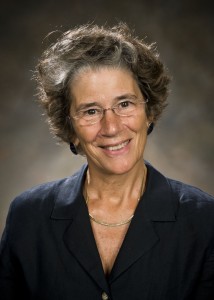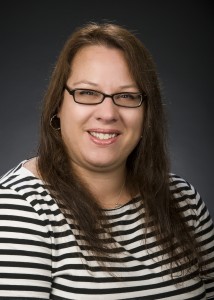A physician can diagnose disease, prescribe medicine and develop a treatment plan for a patient. But when a patient needs help beyond the walls of the physician’s office, a community health worker can step in and provide that critical link between the medical community and additional health and social services available within the larger community.
At Wright State Physicians Family Medicine, Michelle Nelson, a community health worker, provides that link. Since she started in her position in March 2015, Nelson has worked with hundreds of patients.
One such patient came to the clinic and was diagnosed with type 2 diabetes, high blood pressure and chronic obstructive pulmonary disease. Additionally, he was alcohol dependent and struggled with depression. Having previously worked at an auto manufacturing plant, he was now unemployed, homeless and finding meals at local churches.
Setting up a treatment plan to better manage his chronic health conditions was just the first step in a long recovery process. And this recovery process couldn’t really get started without also addressing the depression and alcohol dependence.
“I met this patient during his first visit at Wright State Physicians Family Medicine,” Nelson said. “He begged me for help.”
Nelson got right to work, first contacting the Area Agency on Aging and collaborating with a caseworker there. They had difficulty placing him into a detox program because of his age and medical issues.
But Nelson persevered. After scouring several counties and being turned down by numerous places, Nelson and the caseworker were able to place the patient at a nursing and rehabilitation center. He received the medical care he needed and was able to detox.
“Today this patient is living in an apartment in a safe environment and his Social Security supports his rent,” Nelson said. “He is able to buy groceries and eat at home. He continues to go to counseling for alcohol dependence and has been doing well.”
As part of its commitment to being a patient-centered medical home (PCMH), Wright State Physicians Family Medicine sees the value in making this service available to patients.
Donald Clark, M.D., assistant professor in the Department of Family Medicine at the Wright State University Boonshoft School of Medicine, said adding Nelson to Wright State Physicians Family Medicine is part of the practice’s mission of being a patient-centered medical home.
It is important to pay attention to the underlying factors present in a community that can affect a patient’s health. These underlying factors may be environmental or economic. One such example would be if communities have access to high quality foods at a grocery store. Many communities are without such resources.
By understanding these underlying factors, a PCMH practice can better support patients in meeting treatment goals and managing chronic disease.

Katherine Cauley is director of the Center for Healthy Communities at the Boonshoft School of Medicine.
The National Committee for Quality Assurance recently awarded Wright State Physicians Family Medicine PCMH Recognition. Under a PCMH model, medical homes foster ongoing partnerships between patients and their personal physicians and a team of health professionals.
Nelson’s position was made possible by the Community Health Workers First grant secured by Katherine Cauley, Ph.D., director of the Center for Healthy Communities at the Boonshoft School of Medicine. The grant enabled Wright State Physicians Family Medicine to hire Nelson to be a frontline public health worker who can link patients to health care information and community services.
In July, the Center for Healthy Communities received a continuation of the Community Health Workers First grant for $208,690 from the Ohio Department of Medicaid/Ohio Medicaid Technical Assistance and Policy Program Health Care Access Initiative Phase 2 – Round 1 Community Health Worker Program.
The two-year grant will recruit, train and retain 20 students in community health worker programs offered through community colleges across the state. In addition, the grant will place community health workers in primary care sites, particularly Federally Qualified Community Health Centers, to demonstrate their effectiveness as part of the primary care team working specifically in the areas of prevention and chronic disease management services as directed by the primary care team.
Wright State Physicians, the physician-managed multispecialty group affiliated with the Boonshoft School of Medicine, is one of those sites. Community health workers also will be placed at Five Rivers Health Center in Dayton and Cross Road Family Health Center in Cincinnati.
Cauley said that integrating community health workers into primary care practices is a win-win for patients and physicians.
“Physicians get to practice at the top of their license, using their time and expertise with a focus on medical diagnosis and treatment, while the community health worker can go that extra mile outside of the doctor’s office to support patients in connecting with resources in the community that contribute to improved health,” Cauley said.
From the Wright State Physicians Health Center, which is located on the campus of Wright State University, Nelson helps patients daily by connecting them to various community resources. She helps arrange transportation for those who cannot get to medical appointments or the pharmacy and makes mental health referrals. She provides those dealing with domestic violence with information and referrals.
She also provides patients with information about housing, dentists and medical equipment in addition to various community programs, including utility assistance, prescription drug information and financial assistance and food pantry locations.
Patients can set up a time to meet with her directly or talk to her over the phone. Sometimes, the physicians bring Nelson in to speak directly with a patient they are treating during a medical visit.
During one patient’s medical visit, Nelson was asked to speak with a grandmother who has uncontrolled diabetes. The grandmother lost her job a year ago because of hospitalization for diabetic coma and recovery. She was struggling with many issues and was depressed. She is raising a young grandson who is battling ADHD. The grandson’s mother is a heroin addict and is in and out of their lives. The grandmother has been struggling to make ends meet and has not been able to follow the diet prescribed for her diabetes. She frequently goes to the emergency department because of blood sugar issues. She misses doctor’s appointments because of transportation issues.
“During the course of working with this patient, I was able to set her up with a case manager through her health insurance program,” Nelson said. “I also showed her how to arrange transportation to her appointments through them as well.”
Nelson put her in touch with the Kinship Navigator Program, also a part of the Center for Healthy Communities, which provides services to grandparents and other caregivers of children not their own. Nelson has continued to work with the grandmother, helping her with disability paperwork.
“One of the biggest things I offer to patients is someone who will listen to them and be willing to take the time to help them,” Nelson said. “It’s important to learn what’s important to the patient and to support them in taking action to improve and manage their health. Sometimes I can make just the right referral for needed services, and sometimes my job is to listen and call the patient back in a couple of weeks to listen some more.”


 Wright State celebrates Student Success Champions
Wright State celebrates Student Success Champions  Wright State gold team captures 2024 Horizon League team title, Flynn individual champion
Wright State gold team captures 2024 Horizon League team title, Flynn individual champion  118 medical students to graduate from Wright State’s Boonshoft School of Medicine April 28
118 medical students to graduate from Wright State’s Boonshoft School of Medicine April 28  Wright State University continues to demonstrate its financial strength with another credit rating upgrade from Moody’s
Wright State University continues to demonstrate its financial strength with another credit rating upgrade from Moody’s  Thousands celebrate the end of Spring Semester with food, fun and friendship
Thousands celebrate the end of Spring Semester with food, fun and friendship 